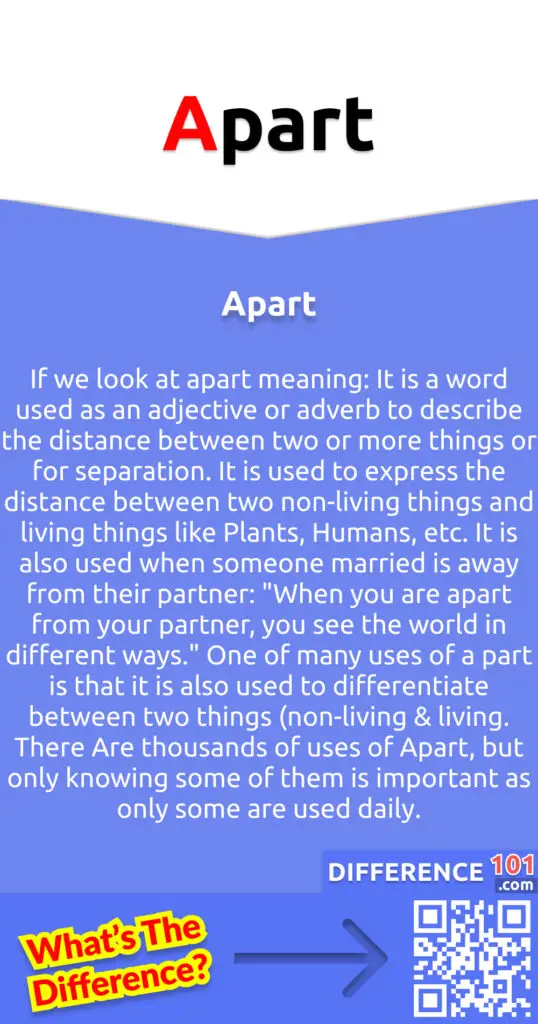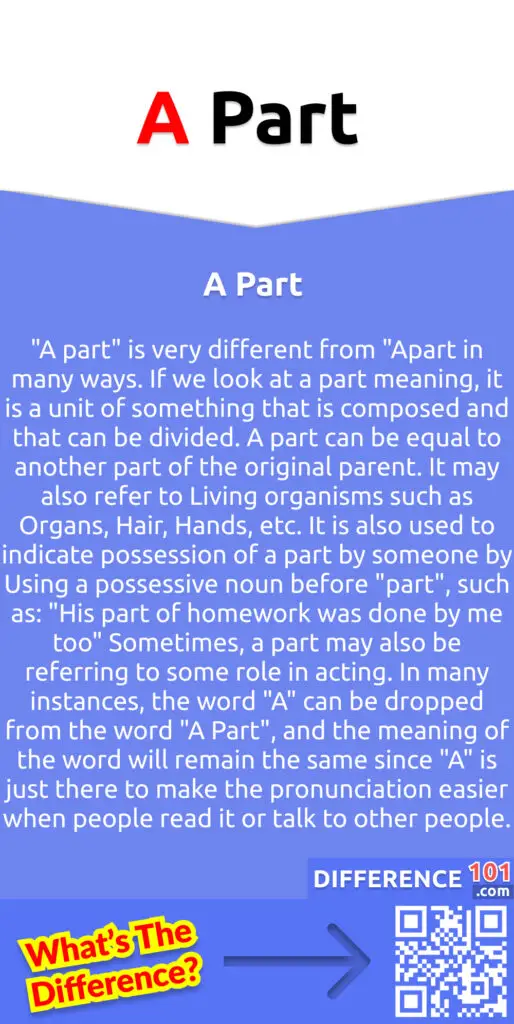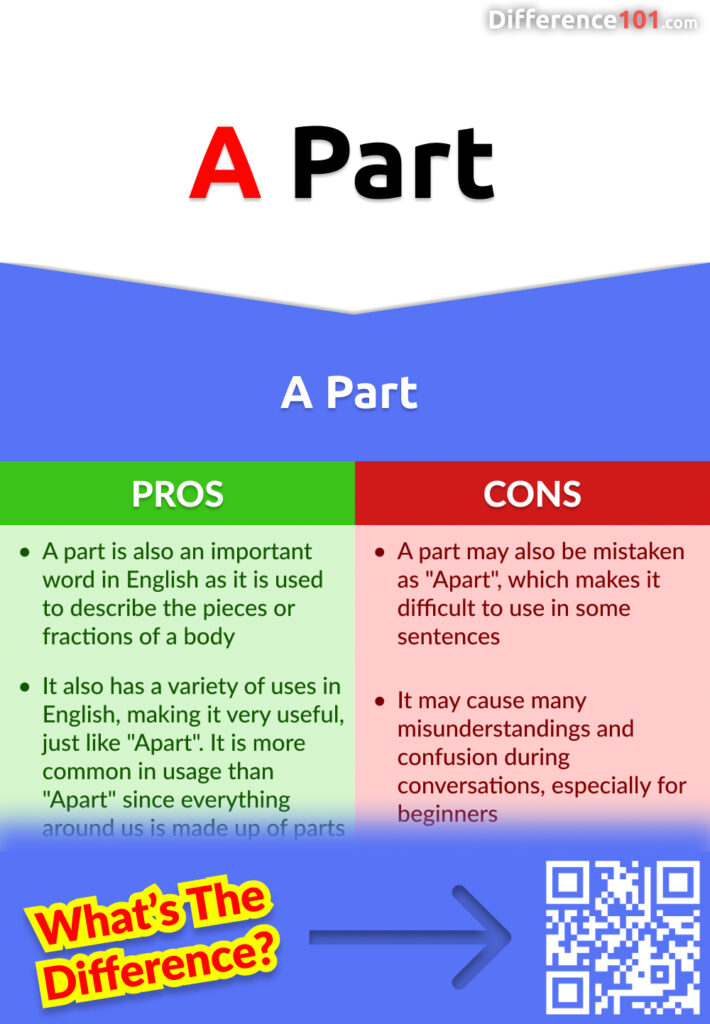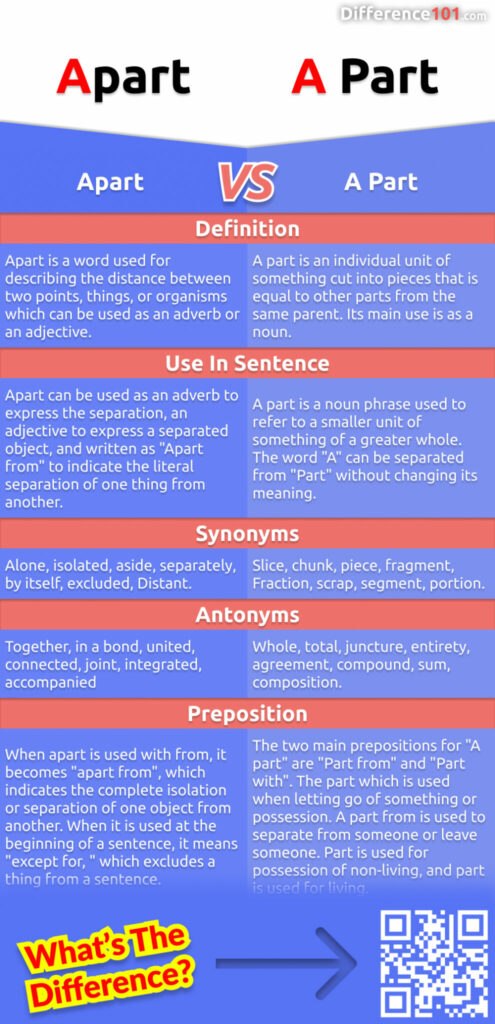Apart vs. A part: both are two words that may be pronounced similarly, but their spelling and meaning differ. The main difference between Apart and A part is that the word “Apart” Consists of only one word, which describes the distance between two things, while the word “A Part” consists of two words.
Let’s take a closer look at A part vs. Apart
| Language | Both words are of English language with different meanings |
| Spellings | Apart contain a single word, while A Part of two words |
| Describe | A part describes distance, while A part describes the component of something. |
| Used As | Apart used as an adjective while A Part as a noun |
Table of Contents
What is Apart?

If we look at apart meaning: It is a word used as an adjective or adverb to describe the distance between two or more things or for separation. It is used to express the distance between two non-living things and living things like Plants, Humans, etc. It is also used when someone married is away from their partner: “When you are apart from your partner, you see the world in different ways.” One of many uses of a part is that it is also used to differentiate between two things (non-living & living. There Are thousands of uses of Apart, but only knowing some of them is important as only some are used daily.
What is A Part?

“A part” is very different from “Apart in many ways. If we look at a part meaning, it is a unit of something that is composed and that can be divided. A part can be equal to another part of the original parent. It may also refer to Living organisms such as Organs, Hair, Hands, etc. It is also used to indicate possession of a part by someone by Using a possessive noun before “part”, such as: “His part of homework was done by me too” Sometimes, a part may also be referring to some role in acting. In many instances, the word “A” can be dropped from the word “A Part”, and the meaning of the word will remain the same since “A” is just there to make the pronunciation easier when people read it or talk to other people.
5 Key Differences Between Apart and A part
| Components | Apart | A Part |
|---|---|---|
| Definition | Apart is a word used fordescribing the distance between two points, things, or organisms which can be used as an adverb or an adjective. | A part is an individual unit of something cut into pieces that is equal to other parts from the same parent. Its main use is as anoun. |
| Use in Sentence | Apart can be used as an adverb to express the separation, an adjective to express a separated object, and written as “Apart from” to indicate the literal separation of one thing from another. | A part is a noun phrase used to refer to a smaller unit of something of a greater whole. The word “A” can be separated from “Part” without changing its meaning. |
| Synonyms | Alone, isolated, aside, separately, by itself, excluded, Distant. | Slice, chunk, piece, fragment, Fraction, scrap, segment, portion. |
| Antonyms | Together, in a bond, united, connected, joint, integrated, accompanied | Whole, total, juncture, entirety, agreement, compound, sum, composition. |
| Preposition | When apart is used with from, it becomes “apart from”, which indicates the complete isolation or separation of one object from another. When it is used at the beginning of a sentence, it means “except for, ” which excludes a thing from a sentence. | The two main prepositions for “A part” are “Part from” and “Part with”. The part which is used when letting go of something or possession. A part from is used to separate from someone or leave someone. Part is used for possession of non-living, and part is used for living. |
Apart vs. A Part Similarities
- Whether it is a part or apart, both come from the same language, in other words, English.
- The former two are pronounced the same way, and the only difference in their spelling is the space or gap between “A” and “Part” in the A part.
Apart vs. A Part Examples
Apart Examples
- Anna and John can’t stay apart for more than one day.
- Adams lives 10 miles apart from his parents and 15 miles apart from his sister.
- Apart from these house chores, the whole holiday was fun and enjoyable.
A Part Examples
- He played well, so we made him a part of our basketball team.
- Sometimes, a part of me thought that I hated her whenever she started to fight with me.
- He only remembers a part of the day when we met for the first time.
Apart vs. A Part Pros and Cons
Apart Pros and Cons

Pros of Apart
- Apart is an important word in English when describing the distance or separation between two things.
- It has a variety of uses in English, such as describing distance and separation. When used with “from” at the beginning of a sentence, it can exclude a person or an object from a sentence which makes it very useful to use.
Cons of Apart
- Though it is an important word, it may be mistaken as “A part”, which causes much confusion for students.
- People who can’t speak English fluently and even native English speakers cause misunderstandings in many conversations.
A Part Pros and Cons

Pros of A part
- A part is also an important word in English as it is used to describe the pieces or fractions of a body.
- It also has a variety of uses in English, making it very useful, just like “Apart”. It is more common in usage than “Apart” since everything around us is made up of parts.
Cons of A part
- A part may also be mistaken as “Apart”, which makes it difficult to use in some sentences.
- It may cause many misunderstandings and confusion during conversations, especially for beginners.
Comparison Chart

Comparison Video
Conclusion
Apart and A Part are both words people often confuse as they use them interchangeably. But this little mistake can cause problems for someone trying to speak or learn English fluently if we look at Apart vs. A Part differences, both have different spellings and meanings. As Apart describes the distance between two or more things or for separation. A part is an individual unit of something cut into pieces equal to other parts from the same parent. And if we compare apart Versus a part usage, Apart can be used as an adverb or adjective to express the separation while used to refer to a smaller unit of something of a greater whole.







